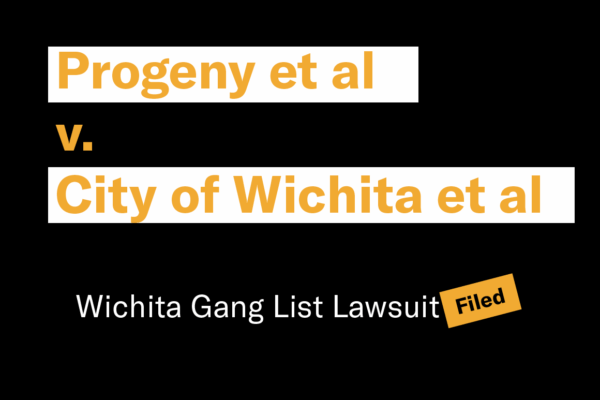WICHITA, KS – In a victory for plaintiffs, the United States District Court for the District of Kansas denied significant portions of the City of Wichita’s motion to dismiss the class-action lawsuit challenging Wichita’s “Gang List.” The ruling allows plaintiffs to proceed with their central claims that the gang database—and the Wichita Police Department's use of it—is unconstitutional.
The plaintiffs’ case was filed April 15, 2021 on behalf of Progeny, a Wichita-based youth civil rights organization, and four individuals by the ACLU of Kansas and Kansas Appleseed, with pro bono assistance from Shook, Hardy, and Bacon LLP. The City of Wichita and the police department’s motion to dismiss was filed on July 9, 2021.
“We are largely pleased with the Court’s order,” Teresa Woody, Kansas Appleseed litigation director, said. “There is no justice in Wichita’s unconstitutional use of its gang list, and the Court's Order allows us to continue to challenge laws and policies that harm residents across Wichita and Kansas as long as they are allowed to exist.”
“The state statute authorizing WPD’s gang list and the department’s application of it is unconstitutional, discriminatory, and harmful, and we are eager to begin the litigation of this case in earnest,” said Sharon Brett, Legal Director of the ACLU of Kansas. “Our clients have been profiled, harassed, and targeted by WPD for years because of their inclusion on this list, and we’re looking forward to putting an end to these practices through this lawsuit.”
The Court preserved all individual procedural due process claims, plaintiffs’ void-for-vagueness claim, and plaintiffs’ claim that WPD policy and statute permitting the gang list to exist is unconstitutional as it infringes on the plaintiffs’ freedom of expression and association protected under the First Amendment. As the Court explained: “Plaintiffs allege continuing restrictions to their speech and expression and stigmatizing designations as gang members that will continue so long as do § 21-6313 and the Gang List. They also allege a credible threat of consequences if they engage in certain types of expression or association. For that reason, Plaintiffs have properly alleged injuries in fact sufficient to seek prospective and declaratory relief.”
Wichita community members can currently be placed on the gang list without notice and without committing or being charged with a criminal offense. List inclusion criteria are “vague and broad and encompass a wide range of innocuous, innocent, and constitutionally protected behavior,” according to the original complaint. Once on the list, community members have no opportunity to contest their inclusion, and inclusion on the list can affect your access to jobs, housing, and more.
Attorneys bringing the suit are asking for injunctive and declaratory relief, challenging Kansas law and WPD policy and asking that the City of Wichita immediately cease its use of the Gang List and prohibit the operation of a Gang List in the future.
##
About the ACLU of Kansas: The ACLU of Kansas is the statewide affiliate of the national American Civil Liberties Union. The ACLU of Kansas is dedicated to preserving and advancing the civil rights and legal freedoms guaranteed by the United States Constitution and the Bill of Rights. For more information, visit www.aclukansas.org.
About Kansas Appleseed Center for Law and Justice: Kansas Appleseed is a statewide organization that believes Kansans, working together, can build a state full of thriving, inclusive, and just communities. Kansas Appleseed conducts policy research and analysis and works with communities and partners to understand the root causes of problems and advocate for comprehensive solutions. For more information, visit www.kansasappleseed.org.
Working with the ACLU of Kansas and the Appleseed Center for Law and Justice, law firm Shook, Hardy & Bacon provided pro bono assistance on the complaint.
Related Content

Progeny et al v. City of Wichita et al

ACLU Of Kansas, Kansas Appleseed File Lawsuit on behalf of Wichita Community Members Unconstitutionally Targeted and Harmed by Discriminatory “Gang” List

Wichita police unfairly target minorities with gang list, ACLU and Kansas Appleseed allege in lawsuit

Settlement to Remedy Wichita Gang List’s Unchecked Power and Establish Oversight
Stay Informed
Sign up to be the first to hear about how to take action.
By completing this form, I agree to receive occasional emails per the terms of the ACLU’s privacy statement.
By completing this form, I agree to receive occasional emails per the terms of the ACLU’s privacy statement.
